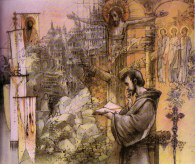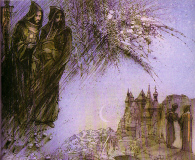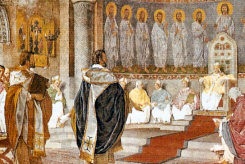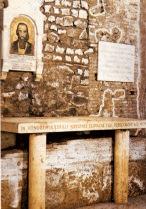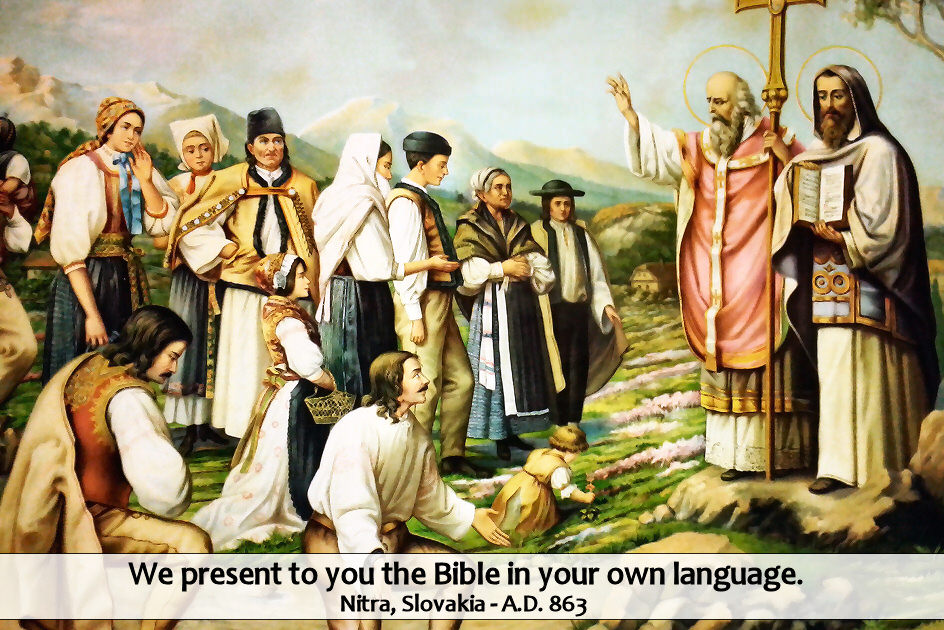
At the beginning of their journey stands the city of Solun. This city (Thessalonica in Greek) lies in modern-day Greece, which was then part of the Byzantine Empire. Methodius was born in 815 and studied law and foreign languages. For ten years, after finishing the law school, he was an administrator of a certain Byzantine district, whose population was mostly made of Slavs. Constantine, born in 827, was also very talented and studied philosophy, literature and the teachings of Christianity. As a seven year old, he had a strange dream. He dreamt that the procurator of the city gathered all women from the city before him and told him to choose one for a wife. Constantine, entranced by the beauty of one, chose Sophia - Wisdom.
This symbolic dream predestined him for the study of philosophy and sciences and Constantine continued his studies in Constantinopole, in school, where the future Emperor Michael III studied at the time. His friends called him Constantine - "the Philosopher" because of his great passion for Wisdom, which proved to be his mission and the path of his life. Constantine refused all earthly pleasures, wished to remain celibate, and in search for the meaning of life, he retreated to a monastery on the mountain of Olymp. Here he met his brother Methodius who has abandoned his important post and was also searching for a more spiritual life.
Meanwhile in the Slavonic countries, civil riots and frequent wars for the rule prevailed over steady kingship. In the eighth century, the Slavs started to group themselves into bigger communities. Their first historically-proven centre was Nitrava (Nitra), where Prince Pribina resided. In 828, Pribina built the first Christian church in that area. But Mojmir, prince of the Old-Moravian principality, drove Pribina from Nitra around 833 and took the trone himself. Pribina fled behind Danube near the Balaton Lake (modern-day Hungary), he built a new castle, Blatnohrad. Mojmir connected the Old-Moravian principality to the Nitrian principality and created a new state - Greater Moravia. The Slavs, however, were not happy with Mojmir's strong political inclination to Franks. That is why in 846, after the disintegration of the Frank empire in Verdune, when the German priests sent more and more news of the Slavs' discontent, the king of the Eastern Franks, Louis the German, attacked Greater Moravia and placed Rastislav, Mojmir's nephew, in his uncle's place.
But Rastislav wished to strengthen his rule and betrayed Louis the German. Rastislav resisted Louis' attacks and in his quest for strengthening the state and removing it from under the German control, Rastislav thought of strengthening the ecclestial politics and creating Greater Moravia's own independent Church province with its own bishop. Therefore, Rastislav requested preachers from Pope Nicholas I who would teach the people in their own language, educate local priests and strengthen the true Christian faith among the Slavs because Christianity in Greater Moravia was weak, often wrongly interpreted and tainted with pagan traditions. The Pope, however, refused. Rastislav, not ready to give up, sent the same request to the Emperor of the Byzantine Empire. When Emperor Michael III received the request, he was certain that the only candidates for this mission were the two Greek brothers, Constantine and Methodius and so he asked them to go. Remembering the words of St. Peter: "Fear God, honour Caesar", they agreed and began preparing themselves for a long and a harsh mission.
Constantine and Methodius were well aware of the hardships experienced by German priests who tried to evangelize in Latin. The brothers agreed to devise a new system of writing for the Slavs, so that they could better understand Christian teachings. Using the small letters of the Greek alphabet, Constantine created the Glagolic alphabet (from Greek 'glagol' meaning sound). The Glagolic alphabet consisted of 43 letters, mainly Greek and a few Hebrew letters, because some Slavonic sounds couldn't be represented by a Greek letter. Working together, Constantine and Methodius translated most of the books of the Bible before they began their journey.
In the memorable year of 863, count Rastislav welcomed Constantine and Methodius in Great Moravia and presented them with their first students. Constantine and Methodius began working immediately. They founded a slavic church school where they taught their pupils grammar, music and, most imprtantly, the teachings of the Catholic Church.
Together, Constantine and Methodius translated all the books of the Old and New Testament (except for the Book of the Machabees), the breviary, liturgical guidelines, song and psalm books, the Collection of Laws for the people and wrote books about Slavonic grammar. Constantine also wrote the famed "Proglas", the versed introduction to the New Testament. They taught their students the liturgical order of rites, morning and evening vespers and the celebration of Holy Mass. Together with their pupils, they preached the true faith to the ordinary people and taught them how to read and write in their new language. They also helped promote state regulations and laws and educated people in the social aspects of everyday lives. With the help of Prince Rastislav, the brothers also tried to organize a distinct Church hierarchy with its own province that could better resist the German influence.
After four years of work (in A.D. 867) Constantine and Methodius started on a long journey. Because Constantine was not a bishop and Methodius not even a priest, they had to travel to Rome to have their students ordained as priests so that more of them could celebrate the Eucharist and administer sacraments. They were also going to ask the Pope to declare the Slavonic tongue an official liturgical language.
On their way to Rome, they stopped at Blatnohrad where Prince Kocel (Prince Pribina's son) received them. The two brothers made a great impression on Kocel and he gave them fifty of his students so that they, too, would learn the Christian faith. Kocel also offered gold and jewellery, but Constantine refused. Instead, he asked for nine hundred slaves to be immediately released.
On the official invitation from Pope Nicholas I they continued their journey to Rome. Before they arrived, Nicholas I died and Pope Hadrian II was elected in his place. He greeted Constantine and Methodius with great respect. However, all was not well. The two brothers had to defend themselves against those who did not wish to have Slavonic become an official liturgical language (the three official languages then were Greek, Latin and Hebrew). Constantine defended his standing in a brilliant speech:
"But now brothers, of what use would I be to you if I came to you and spoke languages, but not in the words of revelation or wisdom, prophecy or doctrine? If speechless instruments, flutes of citars, did not emit different sounds, how would it be known what is being played? And if the war bugle emitted a meaningless sound, who would haste into battle? And so even you, if with your tongue you do not speak recognizable words, who will know what you are saying? You will be talking into the blowing wind! For there are so many different languages on the Earth and not one is without a voice. If I do not recognize the strength and significance of a language, I will be a foreigner to the one that is speaking the language and he will be a foreigner to me!"
Thanks to his diplomatic skills and the urgence of his request, Constantine achieved what he wished for: In 867, Pope Hadrian II approved their mission and their Slavonic liturgical rites and in 868 he released a pastoral letter 'Gloria in excelsis Deo', in which he solemnly declared the Slavonic language the fourth official liturgical language. During the following solemn liturgy, he ordained the pupils of Constantine and Methodius as well as Methodius himself and renewed an old Chuch province of Pannonia and established it as an official province for Greater Moravia.
Exhausted after a long and harsh journey, Constantine weakened and his health declined. Seeing that his life was at its end, he entered into a monastery to spend the rest of his days. He received the monastic name Cyril and with the words "from now I am not a servant to the Ceasar or to anyone else, only to God Almighty", he spent fifty days in the Roman monastery before sickness confined him to bed once more, for the last time. Worried that all he fought for all his life would be wasted, Cyril called his brother and told him:
"Look brother, we were both a team that worked the same furrow. I fall on that arable soil, my day has ended. But you love the Mountain (monastery on Olymp) very much, still, do not because of it abandon your mission, because how can you be saved faster?"
Methodius promised his brother that he would continue in the mission they both started and Cyril left the Earth to meet his Maker on February 14, 869. Methodius buried him in the Basilica of St. Clement. During that time, Pope Hadrian received a letter from Prince Kocel, in which he asked the Pope if Methodius could return to work where he started. Pope Hadrian gladly agreed and ordained Methodius to become the archbishop of the Moravian area. The German bishops, however, did not like this, for in Methodius' ordination they saw a threat to their power. And so, upon his return to Greater Moravia, they captured Methodius and held him prisoner in Bavoria for three years.
Meanwhile in Greater Moravia, Svatopluk, Ratislav's newphew betrayed his uncle and came to power. Rastislav was blinded and thrown into a jail, in which he died a couple of years after. His political play, however, was successful and the church in Great Moravia remained strong; the seed of faith has been deeply sown and firmly rooted in the people's hearts.
In 873, with the help of the new Pope John VIII, Methodius was released from his prison and left to continue with his mission. He returned to Greater Moravia and spent over ten years building, repairing and strengthening the faith among the Slavs. He preached the Good News to neighbouring countries as well: Czechs, Polaks and continued working on translating important liturgical and religious books. His co-operation with Prince Svatopluk, however, ceased and in 880 he had to travel to Rome to defend himself against accusations of heresy. Methodius was cleared of all charges and confirmed to be a true archbishop. Yet on Svatopluk's request, the Pope moved the Church province to Nitra and named Wiching, Svatopluk's close supporter, as the new archbishop. This move led to many unfortunate consequences. When Methodius saw that his life was coming to an end, he called on his students and chose a priest, Gorazd, as his successor. Methodius died on April 6, 885 with the words "Into your hands I commend my soul" on his lips.
Soon after Methodius' death, Wiching misled Pope Stephen V to ban the use of Slavonic liturgy and suspend Gorazd. Under his influence Svatopluk outcast Gorazd and his companions from Greater Moravia. They continued in teaching the Gospel in Albania, Bulgaria, Macedonia and Poland. Slavonic liturgy in Slovakia ceased, but was practised by our neighbours.
The mission of Sts. Cyril and Methodius belongs to the most important in the early Christian era in Europe. Its influence on Central and Eastern Europe remains visible today and their Slavonic liturgy is still used in its original format in many countries throughout this region. The Glagolic alphabet was soon after Methodius' death revised into the cyrillic alphabet, which is in use in Russia, Bulgaria and other countries. All Slavic countries today claim as their own the legacy of Sts. Cyril and Methodius' great mission.

 Slovenčina
Slovenčina